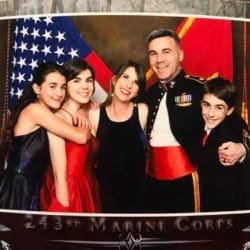Know the value of your role in the life and care of your loved one.
What are you most excited to do as a Dole Caregiver Fellow?
As a Dole Caregiver Fellow, I am most excited about the opportunity to advocate for the importance of having loved ones at the bedside of the injured veteran at the earliest possible time, and to encourage spouses to assume their role as comforter and patient advocate. I’m thrilled to help educate caregivers and assist them in identifying their role and find helpful resources.
What does being a military or veteran caregiver mean to you?
Being a veteran caregiver is an honor to me. There is so much that I can’t control or change in the past. In the present, the here and now, I can smile and offer words of truth and encouragement that may change the trajectory of my veterans thoughts helping lead him to healing. That means a great deal to me. There is no one else who knows him as I do. I am honored to serve in this unplanned role that I have learned the importance of first hand.
At what moment did you realize you were a military caregiver?
I realized I was a military caregiver when I had to take a bold, quick stand for the best and safest care of my veteran. I was needed, not in the way; and not helpless.

My Story
Maghan Spring remembers when she received news that her husband, Chapman, was in critical condition after the aircraft he was piloting crashed into the side of a ship, then plunged into the ocean during a training exercise. She was living in Japan with their five children, their youngest a two-week-old daughter.
Her husband was flown to Australia to undergo emergency surgery. Maghan and the baby joined him in Australia, leaving her other children in the care of friends, and after a month of multiple surgeries they were transferred to Walter Reed National Military Medical Center for a month of inpatient treatment and more surgeries. While assuming the role of advocate for her husband’s medical care, without anyone to guide her, Maghan also had to coordinate moving her other children and household across the ocean to reunite their family. Chapman needed his complete family around him to heal. Each day they were apart was more difficult than the last. It was an emotionally stressful time, but Maghan and Chapman were comforted by their faith in God and supported by local friends and foundations. Their children finally arrived at Walter Reed, not knowing that they would never again return to live in Japan.
In the months to follow, Maghan supported her husband with dressing changes, activities of daily living, and, most importantly, a listening ear and voice of reason. Fortunately, he has made great progress in healing and continues to thrive. Maghan still finds herself helping with stretch routines and seeks to be available to listen and talk him through emotional swings resulting from the crash. In addition to her role as a caregiver, Maghan also homeschools their children, volunteers at her church, and leads a local co-op.
They continue to feel daily the consequences of their life being turned upside down from the rapid, life-altering changes. Maghan often struggles to meet the needs of her age-diverse family as a result of the injuries, separation, and subsequent move. However, her strong faith in God has empowered her as a wife, mother, and caregiver.
Maghan is passionate about encouraging other caregivers, especially immediately after an accident, to be present with their veteran, to listen, and to smile. She also wants to help improve the military’s emergency response for families by making it easier and less costly to reunite following a significant injury. She hopes to use her experience to shed light on what is working and what needs reform.









